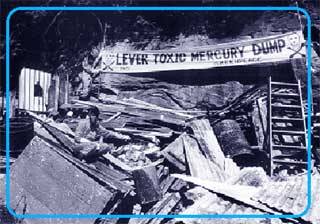Beware of the Trojan horse
Developed countries routinely use India as a dumping
ground for mercury
Two multilateral environmental agreements cover mercury
and mercury compounds: the Basel Convention on Control of Transboundary Movements of
Hazardous Wastes and their Disposal; and the Rotterdam Convention on the Prior Informed
Consent Procedure for Certain Chemicals and Pesticides in International Trade.
These instruments regulate trade in unwanted chemicals,
pesticides and hazardous wastes. However, they do not contain specific commitments to
directly reduce usage and release of mercury. These loopholes are effectively exploited by
multinational industries, which virtually use developing countries as dumping grounds for
cheap mercury and outdated mercury technologies.
The aims and objectives of the Global Basel Convention
are as follows:
- To reduce transboundary movements of hazardous wastes and
other wastes subject to the Basel Convention to a minimum consistent with environmentally
sound management.
- To dispose of hazardous wastes and other wastes generated,
as close as possible to their source of generation.
- To minimise generation of hazardous wastes.
- To ensure strict control over cross-border movement of
hazardous waste.
Pure elemental mercury is not included in the list. It is
mercury in pure form that is used as a raw material in a large number of industries and
this is the one of the main reasons why even the Rotterdam convention does not apply to
mercury compounds with industrial uses. Only mercury wastes of various categories
are included in the Basel Convention
hazardous wastes list.
Washing their hands of the dirt
- In 1982, a thermometer factory was set up in Kodaikanal,
Tamil Nadu, by Ponds India Ltd after dismantling a plant owned by the then Cheseborough
Ponds at Watertown, New York, USA. Hindustan Lever Ltd., a subsidiary of Anglo-Dutch
consumer-care monolith Unilever, acquired the plant in 1987 as part of Unilever’s
global acquisition of Ponds. Raw mercury for thermometers was imported and finished
thermometers were sent to the US. The factory was functioning for almost two decades
without either the employees or the locals being informed of the dangers it posed. By the
late 1990s, contamination in the area was measured at 600–800 times the permissible
limits of 0.01 mg/kg in the soil. (Source : Greenpeace India)
- According to a US Environment Protection Agency (EPA)
official, virtually all the by-product mercury mined inside the US is sold to developing
countries. The combined effects of phased-out uses and increased by-product mercury will
lead to a global glut, sending prices down. There is no doubt that oversupply, without the
necessary global legislation banning mercury use and trade will lead to even more rapid
rates of global contamination. (Source : The Ban Mercury Working Group Secretariat, USA)

Greenpeace/Shailendra yashwant
|
| Mercury badlands: a tryst with
toxicity |
- India is the largest recipient of mercury exports from the
US. In 1999, the US exported 180.45 tonnes of mercury, of which India received 85.45
tonnes. (Source: Down To Earth, January 31, 2000)
- From 1967 to 2000, a chemical plant, last owned by
HoltraChem Manufacturing Company, used about 130 tons of elemental mercury in a
chlor-alkali plant in Orrington, Maine, USA. Numerous spills and leaks caused extensive
mercury pollution. The plant closed down in September, 2000. HoltraChem sold the mercury
to DF Goldsmith, a broker who trucked 50 tonnes of mercury off-site and loaded 20 tonnes
on a ship headed for India, to be resold for re-use. In January 2001, international
protests opposed the "toxic dumping" of HoltraChem mercury in India as a case of
environmental injustice and a source of increased local and global mercury pollution, with
extensive media coverage in the US and other countries. The Government of India rejected
receipt of the HoltraChem mercury and DF Goldsmith turned its mercury shipment around in
Port Said, Egypt for return to USA. (Source : The Natural Resources Council of Maine)
|

